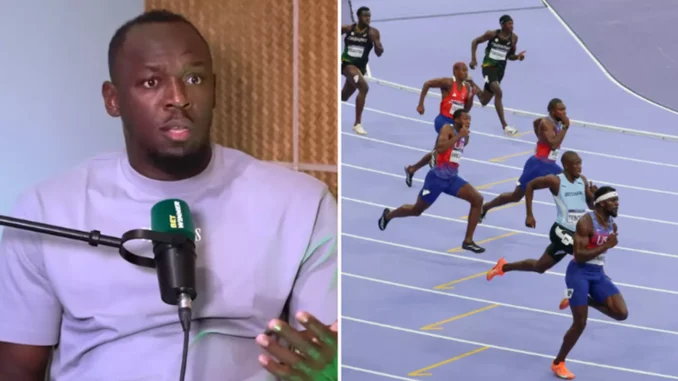
In a shocking twist that has sent shockwaves through the athletics community, one of the United States’ most promising young sprinters has been handed a four-year ban from competition — just months after being publicly praised by the legendary Usain Bolt. The decision, announced by the Athletics Integrity Unit (AIU), comes as a major blow not only to the athlete’s career but also to the growing hopes of American sprinting fans who believed he could be the next big global superstar.
The unnamed sprint star, who had been steadily rising through the ranks over the past two seasons, was widely seen as one of the future faces of track and field. He had posted some eye-catching times on the Diamond League circuit and was even included in the preliminary pool for the U.S. relay team at last year’s World Championships. What made his trajectory even more exciting was a recent interview in which Usain Bolt — the greatest sprinter of all time — said the young American reminded him of his own early days and had the potential to dominate the 100m in the years ahead.
“His raw speed and fearlessness on the track stand out,” Bolt had said. “If he stays focused and avoids distractions, he could be the man to bring back those electric 9.7s consistently.” Those words carried huge weight coming from an eight-time Olympic gold medalist, and they seemed to signal a changing of the guard in sprinting. Unfortunately, that vision may now be on hold.
The AIU reported that the athlete tested positive for a banned performance-enhancing substance during an out-of-competition test earlier this year. While the sprinter’s camp initially hinted at a possible contamination or accidental ingestion, the disciplinary panel found sufficient evidence to enforce the maximum four-year sanction. This effectively rules him out of the Paris 2028 Olympics and could derail what once looked like a career destined for greatness.
Fans have taken to social media to express their disappointment and frustration. Many pointed out the irony that Usain Bolt, a symbol of clean competition and global athletic excellence, had backed this very runner as the sport’s next superstar. “This is heartbreaking,” one fan wrote on X (formerly Twitter). “Bolt believed in him, and now we’re right back to the doping headlines that have haunted sprinting for years.”
The ban also reopens a conversation about doping controls and the intense pressure faced by elite sprinters to perform at the highest level. With the resurgence of American sprinting led by Noah Lyles and Fred Kerley, the competition to be the next U.S. star is fierce, and some argue that the temptation to take shortcuts can be overwhelming for young athletes trying to break through.
For now, the sprinting world is left wondering what could have been. Bolt has yet to comment on the ruling, but given his outspoken nature, many expect him to weigh in soon. Whether this young sprinter can rebuild his career after serving his ban remains to be seen — but one thing is clear: the road back to the top will be far harder than the sprint that got him there.
Be the first to comment